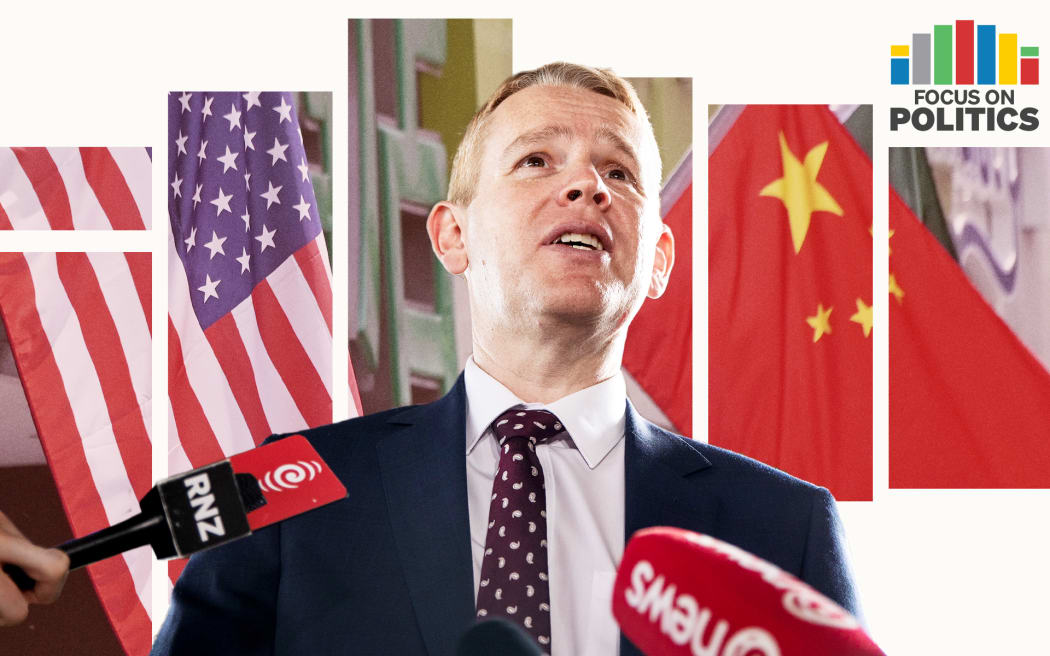
New Zealand Prime Minister Chris Hipkins. Photo: RNZ
'PNG is a really really important relationship, but also development needs are really very substantial' - Robert Ayson
Prime Minister Chris Hipkins' whistlestop trip to Papua New Guinea sends a clear message: superpowers may come and go, but New Zealand is here to stay.
The US and PNG signing a security deal is the latest iteration of increasing competition in the region, but strategic studies expert Robert Ayson says New Zealand has ways of staying close to its Pacific neighbours - despite the US-China struggle for influence.
Hipkins touches down in Papua New Guinea's capital Port Moresby on a muggy Sunday evening, welcomed by a sprawling red carpet, dozens of armed troops and the New Zealand national anthem.
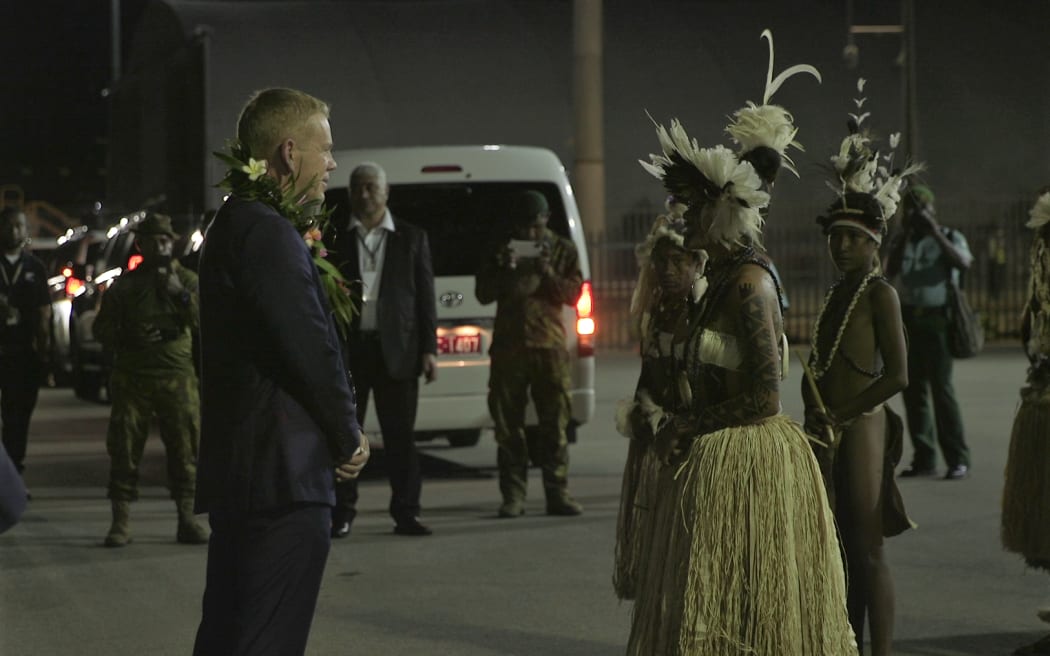
Prime Minister Chris Hipkins is greeted on arrival in Port Moresby, the capital of Papua New Guinea. Photo: RNZ / Samuel Rillstone
He is there in part to meet for the first time with Pacific and international counterparts - including Cook Islands PM Mark Brown, PNG's James Marape, and India's Narendra Modi - but the centrepiece of the summit was the signing of a defence pact between PNG and the United States.
His meeting with Marape over breakfast just a few hours before the signing left Hipkins with "greater clarity" about what PNG wants out of the deal.
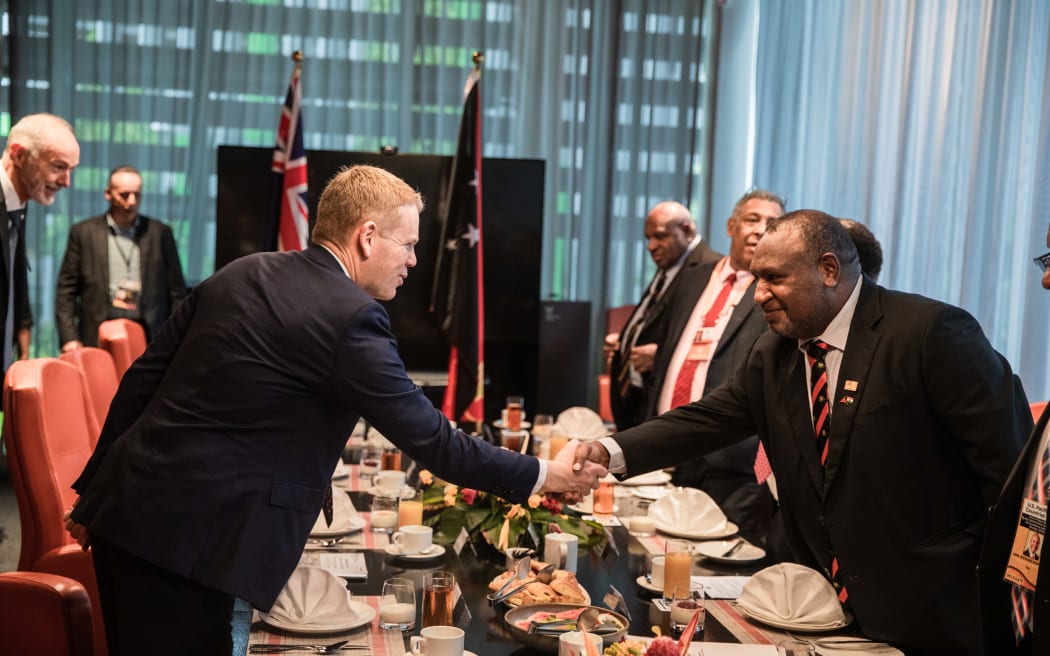
Chris Hipkins shakes hands with Papua New Guinea Prime Minister James Marape. Photo: RNZ / Samuel Rillstone
He told reporters it was not just about security but included things like electrification: "I would see this more of an extension of an existing relationship," Hipkins said.
But it goes well beyond a deeper bilateral relationship, giving American forces uninhibited access to PNG's territorial land, waters and airspace in exchange for roughly $45 million dollars' worth of development programmes.
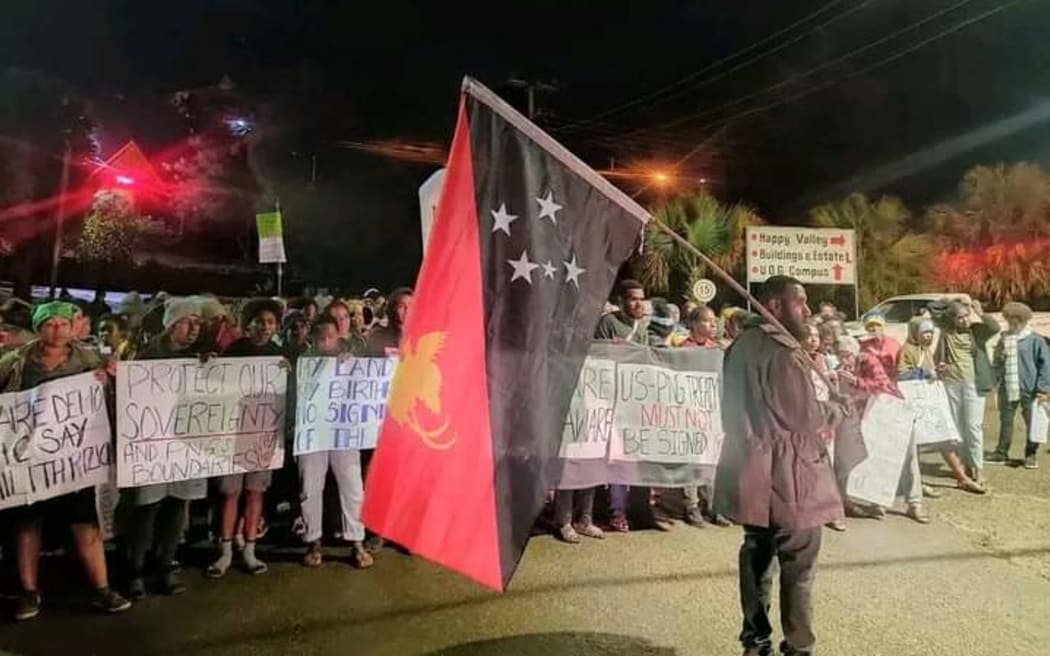
University of Technology students in Lae, Papua New Guinea's second-largest city, protest the signing of the defence cooperation deal with the US. Photo: Supplied / Lae University of Technology Student
Ayson says it's a significant step for US access in the region.
"The US does get greater access to PNG facilities, and so it gets that operational advantage and that also means, for example, it has another place to disperse its forces when it gets concerned about the range of China's missiles - should it come to that."
Read more:
- Pacific health, IT and water to benefit from Indian commitment
- How successful was PM Chris Hipkins’ trip to Papua New Guinea?
- 'Two-way highway': PNG-US defence pact signed
- Prime Minister Chris Hipkins to visit India and talk free trade
- 'There must be clarity': Students protest US defence deal
- Hipkins in PNG: 'Military presence doesn't necessarily signify militarisation'
- Security Pact: PNG expects more US Military boots on ground
- Chris Hipkins to meet Indian PM, Pacific leaders, US Secretary of State at summit
PNG is just 5km north of Australian territory, and Ayson says it's strategically the most important country in the South Pacific, particularly in terms of the US-China contest for influence. The third-largest island nation in the world and home to more than nine million people, it also has drastic development needs.
One of Hipkins' visits is to Gordons Market, a bustling facility for locals to buy and sell fruit and vegetables built with $15m from the New Zealand government. One man says unemployment and job shortages are top of mind for most locals, who get by selling at markets like this.
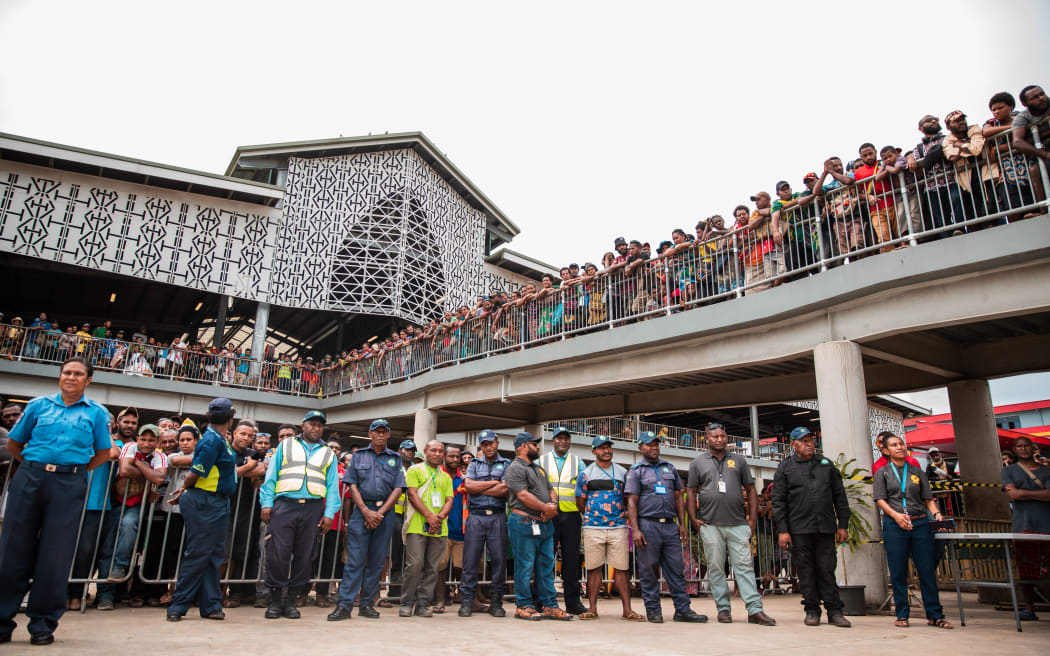
Gordons Market. Photo: RNZ / Samuel Rillstone
"I don't think most of the people feel like security threat. Like, most of the people they're uneducated, they don't know the influence of the developed countries, their influence towards us, therefore they just do the day-to-day living."
Port Moresby-based sailor Aukustine Wariki - whose work has taken him to New Zealand - says the market suits the needs of the city and wider central province, but more is needed.
"Things are going up in the cities, but the development has to go to the rural areas where the people live, which will stop them coming, flocking to town and [means they can] do their activities like farming and whatever - things that can really sustain their lives."
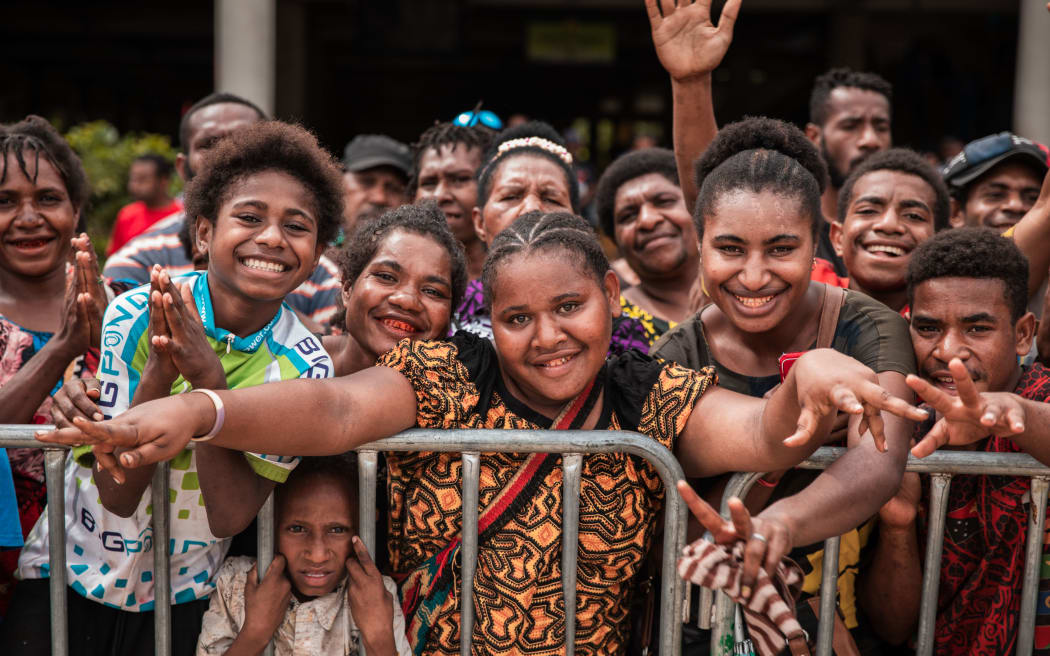
Locals at the Gordons Market in Port Moresby. Photo: RNZ / Samuel Rillstone
"I mean, the Chinese, they do a lot of business in Papua New Guinea - but our safety has to be guaranteed."
China has been putting investment into the Pacific for decades, but recently ramped that up. A security pact between Beijing and PNG's close neighbour Solomon Islands raised concern from neighbouring countries, and put competing superpowers on notice.
Then-prime minister Jacinda Ardern described it as "gravely concerning" at the time - a stance Ayson says is hard to square with Hipkins' on the US-PNG deal.
He says New Zealand is straddling two competing impulses. One is anti-militarisation.
"That means not wanting to see a greater military buildup, whether that's through the supply of arms, or whether that's through the positioning of forces or whether that's through building up things that might become military bases.
"That's also connected to this view ... as [Foreign Minister] Nanaia Mahuta has suggested - that New Zealand takes a country-agnostic view to militarisation - in other words, it doesn't matter who is doing it, it's not welcome."
The other side is a more hawkish support for Western power in the South Pacific, "which means more of the US presence is welcome, it means a strong Australian role, it means welcoming others who are often regarded as like-minded partners - so Japan, the UK, and of course, there's the French role.
"In that context, China's growing role is a particular concern, it's a challenge to that Western maritime predominance."
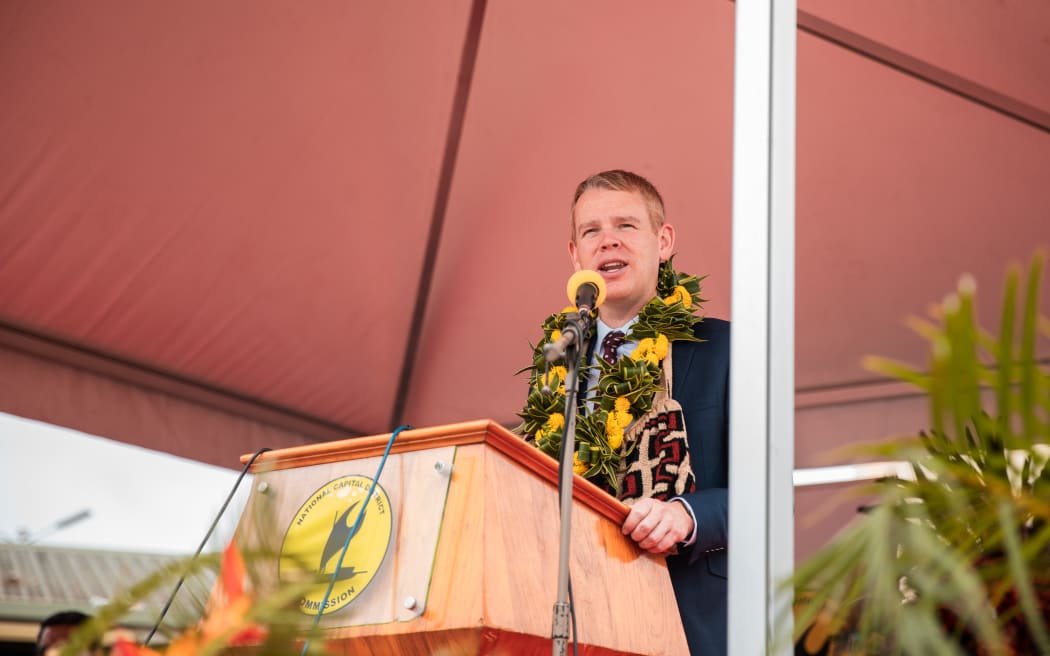
New Zealand Prime Minister Chris Hipkins addresses the crowds at Gordons Market. Photo: RNZ / Samuel Rillstone
In an interview with Morning Report host Ingrid Hipkiss this week, Hipkins described the US role in the Pacific as long-standing, "and they are more predictable - we understand what their motivations there are, they are quite transparent with us about that, and so we do know what we're dealing with there".
Ayson says it means New Zealand trusts the US - on security, at least - but not China.
"When you say, 'you're not being transparent enough, you're not predictable enough', that's kind of what that means -because even if China had ... given months and months of advance notice about what it was planning to do with Solomons, Australians would still have been absolutely alarmed about it, there would have been alarm in Washington, and I don't think Wellington would have been happy with it either."
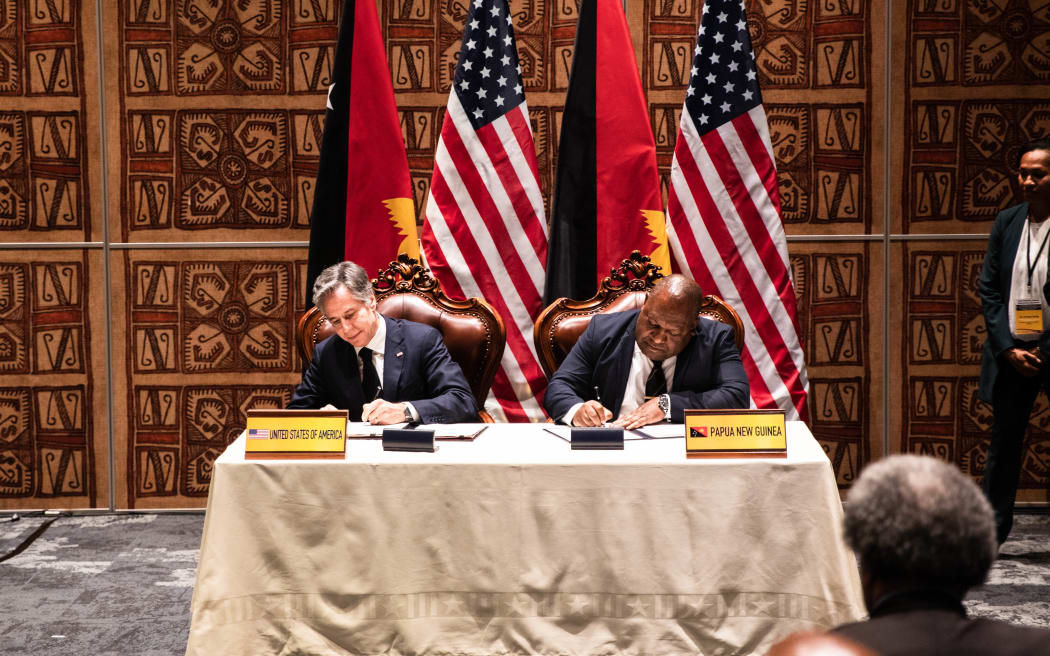
US Secretary of State Antony Blinken and PNG Prime Minister James Marape sign the US-PNG defence pact. Photo: RNZ / Samuel Rillstone
He says strategic competition means more big players in the region and decreases New Zealand's ability to shape events but one of New Zealand's few advantages in the situation is the ability to offer something different.
"There is something to be said for New Zealand to continue focusing on those non-security aspects of economic and other assistance to its Pacific Island neighbors and to countries that are a bit further away than just being neighbors as well," he says.
"Where analysts automatically assume that everything is about the great power contest, continuing on with aspects of ... economic assistance, development assistance, educational assistance - that makes an awful lot of sense."
In this week's Focus on Politics, Political Reporter Anneke Smith visits Papua New Guinea and comes to grips with an international struggle for power.
Listen free to Focus on Politics on Apple Podcasts, on Spotify, on iHeart Radio or wherever you get your podcasts.
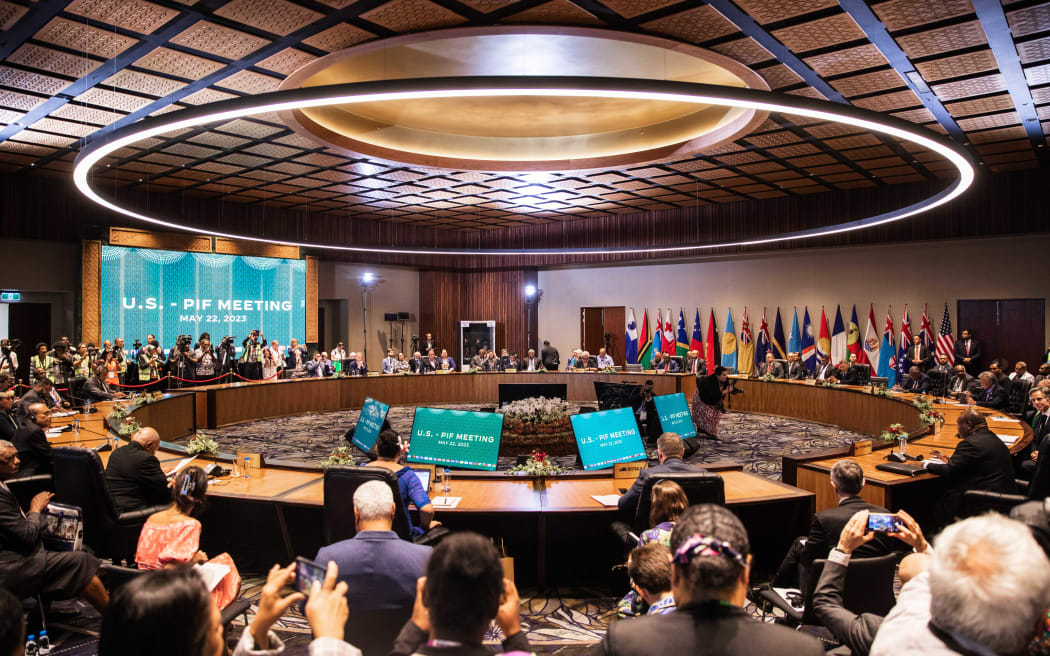
The US-Pacific Island Forum Summit roundtable. Photo: RNZ / Samuel Rillstone


